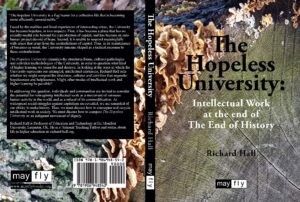It looks likely that my next monograph, The hopeless university: intellectual work at the end of the end of history will be out with MayFly Books in early May.
There is a synopsis here.
There is a podcast here.
I presented some ideas, with a recording and Q&A here.
There is a published article here.
There is music by Rae Elbow and the Magic Beans here. NB a wonderful, full album in partnership with Rae Elbow will be released with the book. It’s a multimedia sensation.
Endorsements
In defining his position as a Marxist, Raymond Williams wrote that the most formidable task of all is to show the connections between “the formations of feeling and relationship which are our immediate resources in any struggle”. In Hopeless University Richard Hall takes up this task seriously. He helps us to understand how the current “university-as-is” relies on the universalization of anxiety and the spread of alienation. They are means through which it sustains its reign during the very last of its days, literally, at the end of the End of History. Moving from hopeless hierarchies, elitists privileges, widespread pathologies of the capitalist academic workplaces to ineffective positivist methodologies that lay at the core of the contemporary university, Hall criticizes the widespread culture of self-harm, imposed precarity, senseless competition, to address the contradictory essence of the hopeless institutions. We are dwelling in this contradiction. It makes our days unbearable; it makes us dire and dull; it prevents us from breaking the vicious circle of hope and despair. However, we know all too well that hope is no plan for liberation from this condition. Hall suggests that to escape it, we need to find the strength in what we have and who we are – in our daily practices of solidarity and mutuality, in our acts of self-care and kindness. By these means, we can finally face the call to starting the exodus from the tight walls of our “sausage factories”. The Hopeless University is the first and necessary step on this long path.
Krystian Szadkowski, Institute of Philosophy, Adam Mickiewicz University, Poznań, Poland.
In The Hopeless University Richard Hall builds on his previous book The Alienated Academic as he argues against the University in its current form. While already exploring hopelessness and the corresponding Weltschmerz academics feel towards their place of work in his previous works, he delves deeper into the idea of refusing what the University has become; an anxiety machine responsible for its workers’ ill-health, PhD students’ anxiety and depression and even academics’ and students’ suicides, for the sake of producing labour power and capital. Not only does the book reflect on the circumstances of those involved, it also situates the University within the socio-economic and socio-environmental crises that are currently taking place on a global scale. In doing so, Hall includes a critique of the University’s response to events such as the Black Lives Matter movement or the Covid-19 pandemic, highlighting its incompetence to offer solutions and position itself as anything but an anti-human project that puts profit before people. Casual workers have become more casualised, those with caring responsibilities are left to carry the burden, and work life further intrudes into private life through increased workloads that are to be done from home, resulting in a constant connection to the institution. Hall reiterates the non-neutrality of the University and its complicity in the reproduction of inequality and inequity, as those in precarious position are further exploited when they are gendered, racialised, disabled and/or queer. Thus, he does not treat these groups as an afterthought, despite him not facing the same challenges, making this book a good reminder for those who occupy “safe” positions within the academy to remember their privileges and continue to challenge their institutions on behalf of those who might not have the same degree of freedom. Towards the end of the book, Hall calls for the abolition of the University as we know it, for steps to be taken that are impossible in the hopeless institutions that currently exist. His critical analysis throughout the book leads Hall to conclude that only when the forces and relations of production are dismantled, another University, one that fosters community and promotes solidarity not just within the elitist walls of the institutions but also outside by joining working class organisation, can be possible, if at all.
Svenja Helmes, PhD student at the University of Sheffield and co-author of Life for the Academic in the Neoliberal University.
At the end of The End of History, we urgently need brave voices to tell us that, no matter how fervently we might hope, we must confront the stark truth that everything may well not turn out all right; to confront ourselves in and of this truth; and to begin the necessary process of grieving this truth. Richard’s forensic deconstruction of the capitalist university, and the senses of hopelessness and helplessness it generates, leaves us unable to deny this truth any longer. Yet, it is Richard’s unflinching commitment to a dialectical materialism that enables him to reveal how the transformative power of truth takes seed when we finally and fully allow it into our hearts. It is in this heart-centred dialogical process of reintegration within and reconnection without that he locates not just the healing power of sharing our stories, but the first stirrings of a movement. It is a movement of negation of the Hopeless University’s own negation of our difference and denial of our being; a movement of the deepest, most essential yearning for our personal and collective authentic becoming; and, therefore, a movement with the capacity to imagine, explore, and organically establish modes, cultures, and even institutional forms of knowing that can birth a new system of social metabolism beyond capital’s tyrannical reign.
Each page of this wonderful book is filled with vulnerability, courage, wisdom, and, above all, love. Richard combines all four of these qualities in his refusal to offer any strategic blueprint for an alternative post-capitalist university and in his invitation to us to sit – to sit with ourselves and with each other, with our wounds and our pain, to sit with the bewildering but beautiful entangled messiness of our lives and our world, and to sit attentive at last to a present that can integrate and be fertilised by a past in order to conceive a new dawn yearning to be born.
Joel Lazarus, University of Bath.

